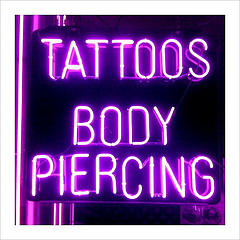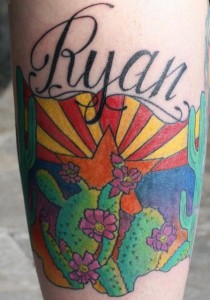Tattoos are “pure speech” & protected under the Constitution

In November, 2011, an Arizona appellate court declared that “a tattoo, the act of tattooing, and the business of tattooing constitute pure speech entitled to the highest level of protection under our state and federal constitutions.”
The issue came before the court when Ryan and Laetitia Coleman applied to the City of Mesa, Arizona for a business permit to open a tattoo shop. They considered themselves “body artists” and owned a similar business (Angel Tattoo) in Nice, France. The City required tattoo parlors, body piercing and pawn shops to be licensed. The City Council voted against the Colemans explaining it wasn’t appropriate for the neighborhood. No evidence was presented regarding adverse effects to local residences or businesses. Opponents merely speculated that the tattoo shop might have a negative impact on the area.
The Colemans filed a lawsuit alleging a violation of their free speech and a denial of their equal protection rights under the First and Fourteenth Amendments. They pointed out that Arizona’s constitution guaranteed that “every person may freely speak, write or publish on all subjects, being responsible for the abuse of that right.” Furthermore, the U.S. Constitution prohibits the government from “abridging the freedom of speech or of the press.” Their equal protection claim was based on the fact that other businesses in Mesa were treated differently in the licensing process.
The trial court ruled in favor of the City of Mesa and the Colemans appealed to a higher court. On November 3, 2011, the Court of Appeals ruled unanimously that “tattooing is purely an expressive activity entitled to fullest protection afforded by the First Amendment.” The court ruled that a tattoo conveys a message and, as such, is protected speech. Reasonable government restrictions may be imposed regarding time, place and manner of conducting a business.
Judge Ann Scott Timmer wrote the opinion outlining a brief history of First Amendment protections and the difference between “pure speech” and “symbolic conduct.” Speech that is written or spoken such as a newspaper ad, a verbal comment at a public rally, poetry, a painting, stained glass window, radio, TV, music and live entertainment are examples of pure speech. Expressive or symbolic speech includes voting, wearing a black armband to school, marching and picketing on a public street. Unprotected speech are those expressions that consist of “fighting words,” obscenity, words that incite violence or defame another person. Each of these examples has been litigated in the courts and are cited in Timmer’s opinion (see link below). If you are researching the First Amendment for a paper or presentation at school, this opinion is a good start.
The case was appealed to the Arizona Supreme Court which issued its decision on September 7, 2012. The court upheld the Court of Appeals ruling “Recognizing that tattooing involves constitutionally protected speech, . . .” This is believed to be the first state Supreme Court to uphold tattooing as speech under the First Amendment.
To read the Court of Appeals decision in this case, see here:
*Coleman v. City of Mesa (Court of Appeals, Div. 1, November 3, 2011).




I agree with the ruling 100% – tatoos are protected speech.